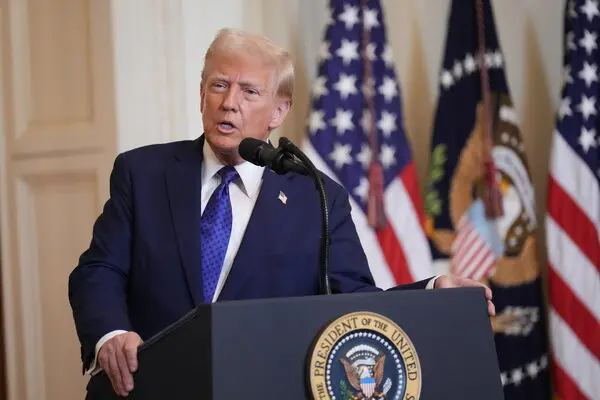Islamabad, April 01: U.S. President Donald Trump announced on Monday that he plans to introduce new tariffs later this week, asserting that he will approach the matter with fairness while addressing what he sees as long-standing trade disparities.
However, analysts believe because of lower trade volume and lower tech products of export with textile the key portion, the impact on Pakistan seems to be negligible.
The impact on region like Asia and Europe could be higher and that indirect impact could lightly affect the Pakistani exports, but negligible in every aspect.
Trump, who has exercised his presidential authority extensively since assuming office, indicated that he could reveal the details of these “reciprocal tariffs” as early as Tuesday night.
He has repeatedly claimed that the U.S. economy has suffered due to trade imbalances, arguing that the country has been economically disadvantaged by numerous nations.
Promising what he calls a “Liberation Day” for the United States, Trump assured reporters that his administration’s approach would be measured.
“We’re going to be very nice, relatively speaking, we’re going to be very kind,” he remarked on Monday.
Despite these assurances, critics caution that imposing these tariffs could spark a global trade war, prompting retaliatory measures from major U.S. trade partners, including China, Canada, and the European Union.
China, Korea and Japan for Free Trade Regimes
In response, China, South Korea, and Japan have expressed their commitment to strengthening free trade agreements among themselves.
Trump, however, dismissed concerns that his policies would drive allies toward closer ties with Beijing.
He also hinted that discussions regarding TikTok’s regulatory status in the U.S. could be tied to negotiations with China over tariffs.
White House Press Secretary Karoline Leavitt confirmed that the administration intends to announce “country-based tariffs” on Wednesday, though Trump remains interested in implementing sector-specific tariffs as well.
Read More: Trump Hints at Possible Trade Deal with China Amid Escalating Tariff War
The uncertainty surrounding these measures has unsettled financial markets, leading to declines in key European and Asian indices. However, the Dow and the S&P 500 managed to register modest gains.
Market analysts have voiced concerns about the broader economic implications, particularly after Trump suggested that the tariffs might extend to “all countries.”
The Wall Street Journal reported that advisors have explored the possibility of imposing global tariffs as high as 20%, potentially affecting nearly all U.S. trade partners.
While Trump has not confirmed specific figures, he has indicated that his tariffs will be “far more generous” compared to those levied against American exports.
The prospect of widespread tariffs has heightened concerns about a potential U.S. economic downturn.
Analysts Estimates Recession
Goldman Sachs raised its estimated probability of a U.S. recession over the next 12 months from 20% to 35%, citing weaker growth projections, declining business confidence, and White House statements that suggest a willingness to endure economic hardships to achieve trade policy goals.
The firm also adjusted its year-end inflation forecast for 2025 in response to the evolving situation.
Meanwhile, trade partners have begun taking countermeasures. China and Canada have announced retaliatory tariffs on American products, while the European Union has scheduled new tariffs to take effect in mid-April.
Additionally, Vietnam has reduced import duties on certain items, including automobiles, liquefied gas, and agricultural goods.
Japan, anticipating further disruptions, has announced plans to establish approximately 1,000 “consultation centers” to assist businesses impacted by U.S. tariffs.
During a Reuters event on Monday, International Monetary Fund (IMF) Managing Director Kristalina Georgieva acknowledged growing concerns over the tariffs but suggested that their global economic impact may not be severe.
Ryan Sweet, an economist at Oxford Economics, warned that Trump’s approach remains unpredictable, stating, “Expect the unexpected.”
He anticipates that the administration will “target some of the largest offenders.”
Sector-Specific Tariffs
Beyond broad country-based tariffs, Trump is also expected to introduce sector-specific tariffs, particularly on pharmaceuticals and semiconductors.
Last week, he announced that tariffs on automobile imports would take effect on Thursday.
Economists believe that the upcoming tariffs may be aimed at trade partners that have consistently maintained substantial trade surpluses with the U.S. Treasury Secretary Scott Bessent recently identified a group of 15 nations with significant trade imbalances, referring to them as the “Dirty 15.”
Among them are China, the European Union, Mexico, Vietnam, Taiwan, Japan, South Korea, Canada, and India.
Concerned about the potential fallout, U.S. trade partners are working to mitigate risks. Reports suggest that India is considering lowering certain trade barriers to avoid being targeted by new tariffs.
Christine Lagarde, President of the European Central Bank, urged European nations to move toward greater economic self-reliance, describing the current situation as an “existential moment” in an interview with France Inter radio on Monday.
British Prime Minister Keir Starmer has reportedly been in discussions with Trump regarding progress toward a UK-U.S. trade agreement, while German Chancellor Olaf Scholz stated that the European Union would stand firm in response to new tariffs but remains open to negotiations.
Greta Peisch, a former U.S. trade official, suggested that there is room for flexibility.
She noted that tariffs could be quickly adjusted or suspended, as seen in February when Washington temporarily halted steep tariffs on Mexican and Canadian imports to facilitate trade negotiations.
As the situation unfolds, the global economic community is closely watching how Trump’s tariff strategy will reshape international trade dynamics in the coming weeks.
